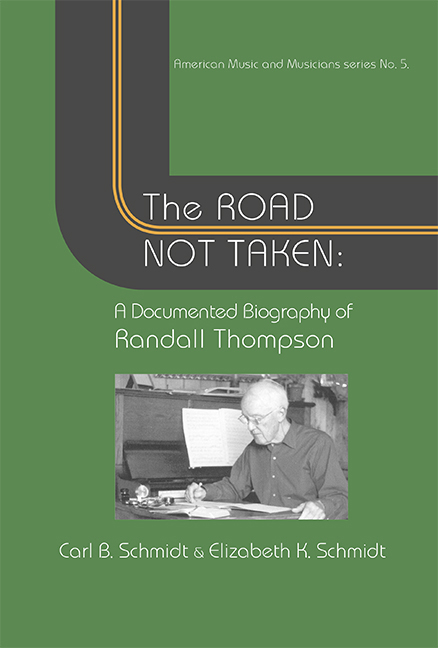Book contents
- Frontmatter
- Contents
- List of Illustrations
- List of Tables
- Library Sigla and Abbreviations
- Guide to Harvard University and Oberlin College Collections Referenced by Box Number
- Preface: Gateway to a Career
- Acknowledgments
- Chapter I Family History and Formative Years
- Chapter II Undergraduate Study at Harvard College (1916-20)
- Chapter III Lessons with Ernest Bloch and Graduate Study at Harvard University (1920-22)
- Chapter IV Damrosch Fellowship Years at the American Academy in Rome (1922-25)
- Chapter V Courtship and Marriage (1925-27)
- Chapter VI New York City—Wellesley College—A Guggenheim Fellowship (1927-31)
- Chapter VII Guest Conducting, Reception of Symphony no. 2, and College Music: An Investigation (1931-35)
- Chapter VIII Life after College Music: An Investigation (1935-37)
- Chapter IX The University of California at Berkeley (1937-39)
- Chapter X Curtis Institute of Music: The Hiring Process (Spring and Summer 1939)
- Chapter XI Curtis Institute (Fall 1939-Spring 1941)
- Chapter XII The University of Virginia (Fall 1941-Spring 1945)
- Chapter XIII Princeton University (Fall 1945-Spring 1948)
- Chapter XIV Return of a Favored Son: Harvard University (Fall 1948-Spring (1957)
- Chapter XV Harvard University (Summer 1957 to July 1, 1965)
- Chapter XVI The Early Retirement Years (1965-75)
- Chapter XVII The Final Years (1975-84)
- Chapter XVIII Recapitulation and Coda
- Bibliography of Works Cited by Abbreviations
- Index
Chapter XVIII - Recapitulation and Coda
- Frontmatter
- Contents
- List of Illustrations
- List of Tables
- Library Sigla and Abbreviations
- Guide to Harvard University and Oberlin College Collections Referenced by Box Number
- Preface: Gateway to a Career
- Acknowledgments
- Chapter I Family History and Formative Years
- Chapter II Undergraduate Study at Harvard College (1916-20)
- Chapter III Lessons with Ernest Bloch and Graduate Study at Harvard University (1920-22)
- Chapter IV Damrosch Fellowship Years at the American Academy in Rome (1922-25)
- Chapter V Courtship and Marriage (1925-27)
- Chapter VI New York City—Wellesley College—A Guggenheim Fellowship (1927-31)
- Chapter VII Guest Conducting, Reception of Symphony no. 2, and College Music: An Investigation (1931-35)
- Chapter VIII Life after College Music: An Investigation (1935-37)
- Chapter IX The University of California at Berkeley (1937-39)
- Chapter X Curtis Institute of Music: The Hiring Process (Spring and Summer 1939)
- Chapter XI Curtis Institute (Fall 1939-Spring 1941)
- Chapter XII The University of Virginia (Fall 1941-Spring 1945)
- Chapter XIII Princeton University (Fall 1945-Spring 1948)
- Chapter XIV Return of a Favored Son: Harvard University (Fall 1948-Spring (1957)
- Chapter XV Harvard University (Summer 1957 to July 1, 1965)
- Chapter XVI The Early Retirement Years (1965-75)
- Chapter XVII The Final Years (1975-84)
- Chapter XVIII Recapitulation and Coda
- Bibliography of Works Cited by Abbreviations
- Index
Summary
We have here a composer who dares to write with a simplicity that often
startles his colleagues. He rides eloquently through the
present in the fine stagecoach of our ancestors.
(Quincy Porter)
… with the simplest means you achieve the most powerful effects.
(Ralph Berkowitz)
The musician who knows only music is pitiful… .
(Randall Thompson)
Thompson occasionally joked about his birth year remarking: “I was born in 1899 and Aaron Copland in 1900. That makes me a 19th-century composer.” For most of his career, he swam steadily against the tide of atonality, serial¬ism, electronic music, and other avant-garde manifestations that preoccupied so many of his 20th century contemporaries. This is not to say, however, that he was ignorant of such trends, that he did not admire some compos¬ers whose works used them, or that he failed to champion the performance of contemporary music of all types. Let us not forget, for example, that while in Rome during 1924-25 Thompson had flirted with astringent dis-sonances and rhythmic complexities influenced by Italian composers such as Malipiero and Casella with whose compositions he had come in contact. Simply put, in his own compositions once he returned to the United States in 1925, he consciously chose “the road not taken” by so many composers of his own generation. His position endeared him to some while inviting the disapproval of others.
As early as November 28, 1926 he commiserated with Leopold Mannes: “League last night and Guild [of Composers] tonight. Do you suppose we’ll ever get anything played at one of those concerts, Leo? I wish I thot that I had it in me to write a piece for 6 instr.s, 6 meas. long, such as was played last night!” For Thompson, who was thoroughly schooled in musical literature of the past and equally cognizant of that of his own time, the rhythmic, harmonic, and textural complexities and innovations that gained notoriety for many composers in the twentieth century, and which occupied so much of the ink spilled by critics and analysts, became foreign to his compositional style. His compositions, however, could not be mistaken for works of a previous century: the anthem Fare Well, for example, abounds in consecutive parallel fifths and successions of unresolved seventh chords, both of which would have incurred the ire of renaissance and baroque theorists.
- Type
- Chapter
- Information
- The Road Not TakenA Documented Biography of Randall Thompson, 1899–1984, pp. 923 - 936Publisher: Boydell & BrewerPrint publication year: 2018

